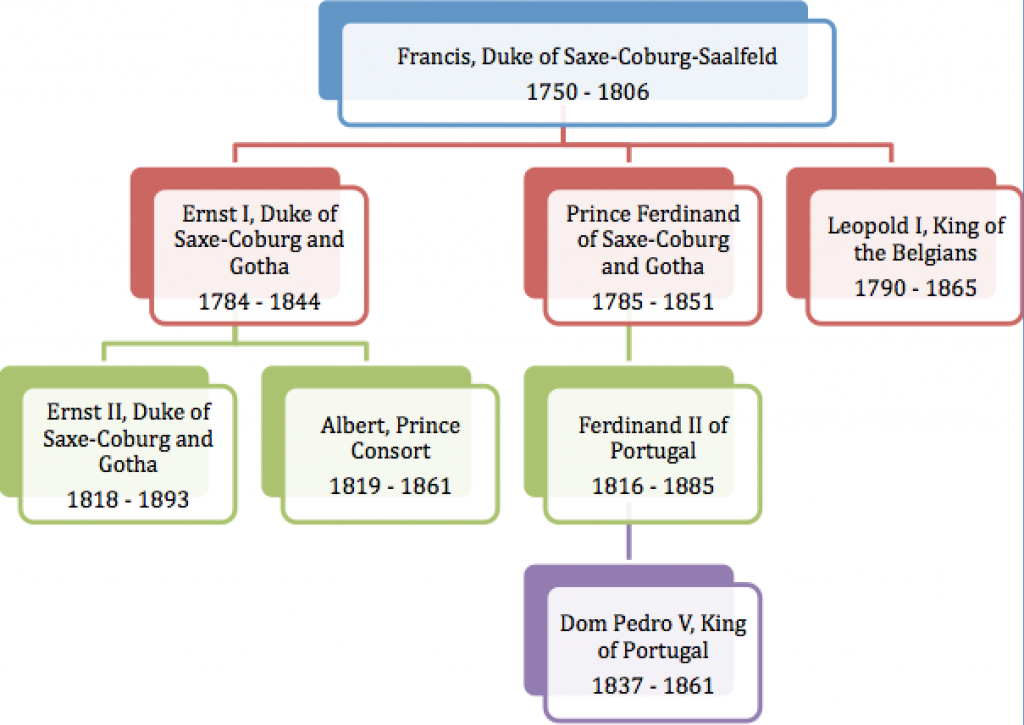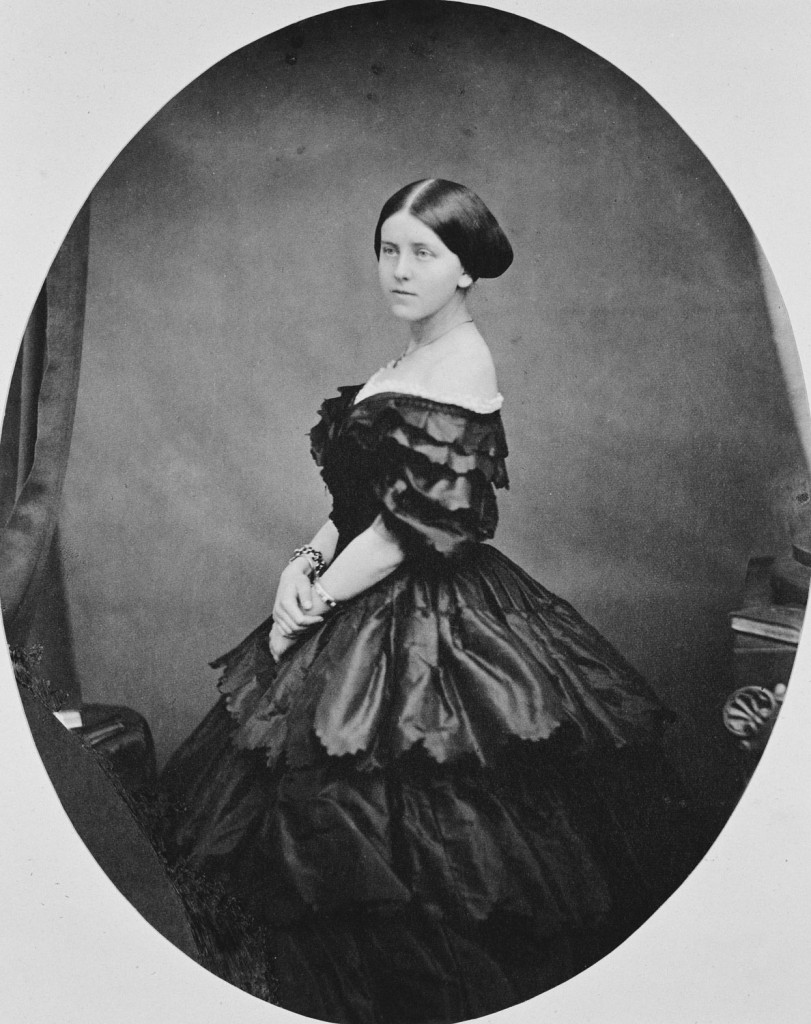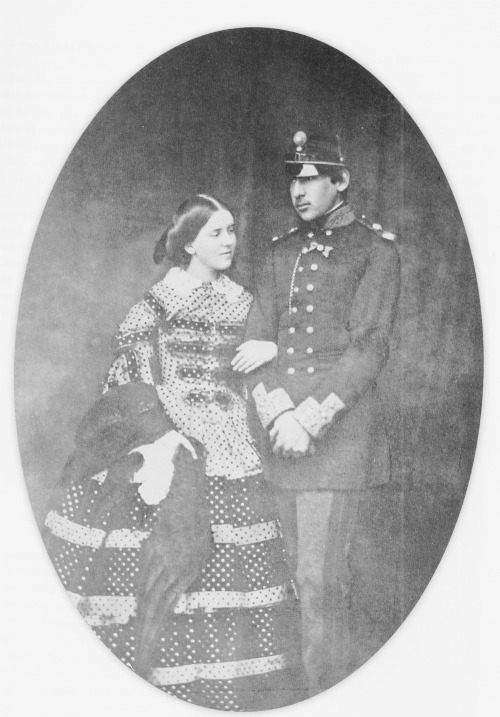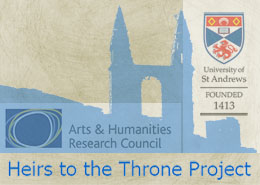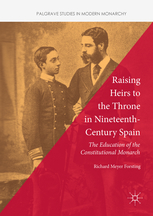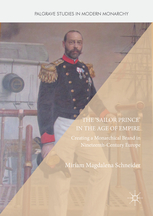The Sorcerer’s Apprentice
Charles A. M. Jones
Unlike most of the other “Heirs of the Month” explored in this series Dom Pedro was already a reigning monarch during the period at the centre of this essay. Though no longer waiting in the wings, he was nevertheless an ‘heir’ to a new era. The political landscape of early nineteenth-century Europe was undergoing a dramatic shift from a system that encouraged fierce competition between states to one of peaceful cooperation. From 1815 onward, the Concert System was established and the five Great Powers – Britain, Russia, Austria, Prussia and France – mediated the conduct of international diplomacy.
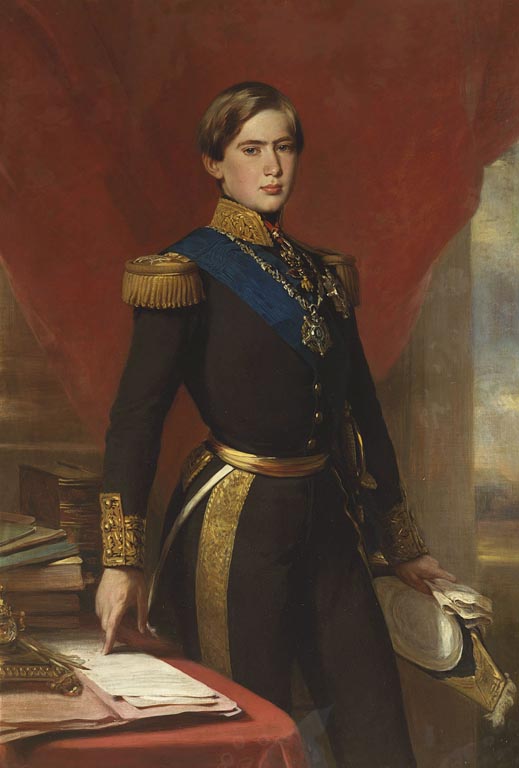
Franz Xaver Winterhalter (1805-73): Pedro V, King of Portugal (1837-61), 1854 (Photo: Royal Collection)
At the same time, monarchy, as an institution, was systematically becoming integrated into the state. The lengthy process of this integration, lasting well into the nineteenth century, provided monarchy with a brief opportunity to carve itself a practical role within the concert system. During this period, the term “monarchical principle”* was utilised in an attempt to define the new role monarchs would have to play, but the exact meaning of what this principle constituted would remain a source of debate between autocratic-conservative and more liberal-constitutional voices. Despite this disagreement, the need for closer inter-monarchical collaboration was recognised by Europe’s royal houses and various means of communication were exploited and expanded.
It is within this atmosphere of carefully constructed correspondence networks and royal visits that Prince Albert, the husband of Queen Victoria and a central figure within the Coburg family’s pan-European network, attempted to further expand dynastic and political ambitions by mentoring the next generation of up and coming monarchs. Albert, a devotee of the monarchical principle, was also a firm advocate of constitutional government. He believed that in order for the institution to survive, a constitutional system was a necessity to safeguard monarchy against revolution. He further believed that unless change was instituted from above, the masses would not only make the change themselves, but would dictate the terms. With limited success in presenting his case to monarchs of his generation, he set his eyes upon the future.
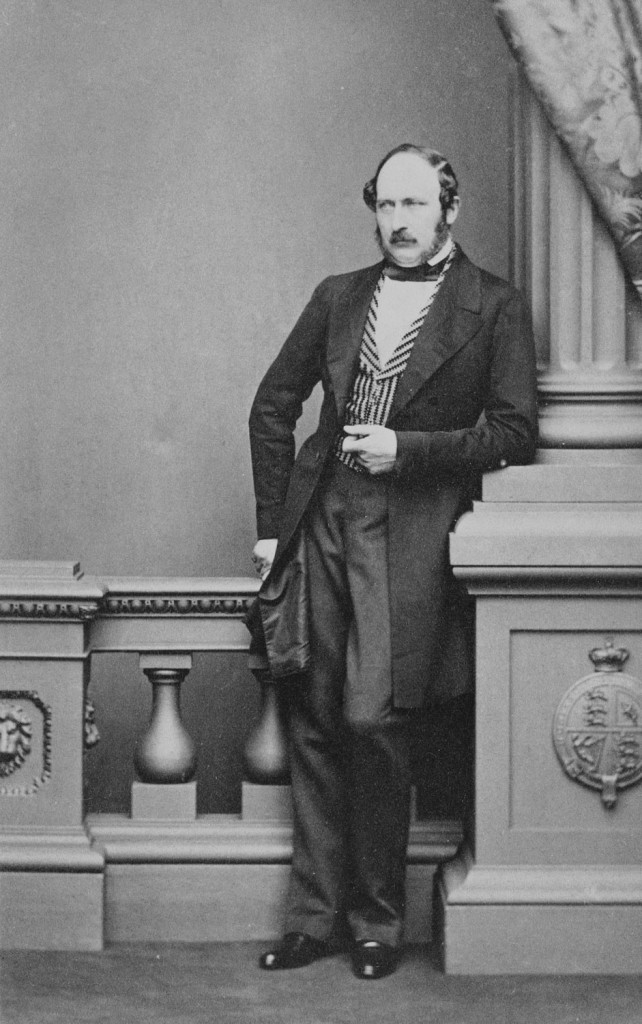
John Jabez Edwin Mayall (1813-1901): Carte-de-visite photograph of Prince Albert, 1861 (Photo: Royal Collection)
When writing to his daughter, another one of his apprentices, on 13 November 1861, only days after Pedro’s early death, Prince Albert clearly expressed the high hopes he had placed in his royal pupil: ‘…he was qualified to effect infinite good for a degraded country and people, and also to uphold with integrity the monarchical principle, and to strengthen the faith in its blessings, which unhappily is so frequently shaken to its foundation by those who are its representatives.’
Albert’s biographers often cite the tragic death of the young King of Portugal, on 11 November 1861, as a starting point marking the Prince Consort’s final decline and death on 14 December 1861. This is not done without a certain degree of justification. Pedro, in addition to being a beloved nephew (and quasi surrogate son), was an eager participant in Albert’s dynastic ambitions: A network of monarchs, linked by blood, as an additional balance to the concert system. Albert’s diary entry for 24 November records that his nights since the event had been ‘almost wholly wakeful’, suggesting a fairly dark melancholy. Consider if you will: Albert and Pedro had actually only been in each other’s physical company for a total of just over a month in eight years. Their paternal-filial bond was formed largely through correspondence and mutual admiration.
Pedro’s character: A question of duality
Pedro was a complicated figure especially in his own country. Upon the death of his mother, Queen Maria II, in November 1853, the 16 year-old Pedro ascended the throne with his father, Ferdinand, acting as regent. His legacy in Portuguese history is passionately debated. He is generally regarded as a popular and progressive monarch. His reign, though short at just eight years, witnessed a period of progress in education, technology, infrastructure and public health. During the cholera outbreak of 1856 and a yellow fever epidemic the following year, Pedro built a lasting reputation amongst the Portuguese populace that bordered on sainthood. He had remained in Lisbon, without regard for his own safety, in order to supervise hospitals and to visit the afflicted. In 1857 Albert would describe this selfless act in letter to his brother Ernst as “very heroic”. This reputation was intensified exponentially in the years following his premature death.
The young King, in spite of his gilded reputation, also has his fair share of detractors. His greatest failing was his personality. Pedro was by nature a pessimist, but his was a particular brand of pessimism that was not attractive in a constitutional monarch. His relationship with Portugal was difficult to say the least. He regarded the country as backward, corrupt and in desperate need of modernisation. He despaired the subjects that divine providence had given him, much less the politicians, who were, in his opinion, of such an inefficient breed that he was obliged to intervene. He had a volatile temper and reacted immaturely to criticism. By his own account, ‘My good mother (Maria II) told me often when I was a child, “your passion is to torment yourself”’.
In short, Pedro was a monarch who meddled in politics too often, was too suspicious of those around him and, to a certain degree, distained his subjects. Yet, he was undeniably gifted, which, far from improving his situation, made it all the more difficult. He had a brilliant mind with liberal views in an unstable and backward Catholic state. As a result there were irreconcilable differences between King and country.
The first meeting: Pedro’s Grand Tour
Albert’s first meeting with his nephew occurred during the latter’s Grand Tour on 3 June 1854. Pedro, travelling with his younger brother Luis, was escorted from Southampton station to Buckingham Palace. Before the month was over, a lasting bond had been forged between the 35 year-old uncle and the 17 year-old nephew. During their stay, the young gentlemen were treated to a host of entertainments: operas, dinners, and even a rail journey to Wales, stopping at major cities along the route. Pedro returned these kindnesses by charming his royal hosts, impressing them with his knowledge and liberal views. By the 18th of the same month, Albert was already advising the young King, helping him with his draft reply to the Lord Mayor’s address at Mansion House the following day. The visit officially came to an end on 3 July, with great sadness on both sides.
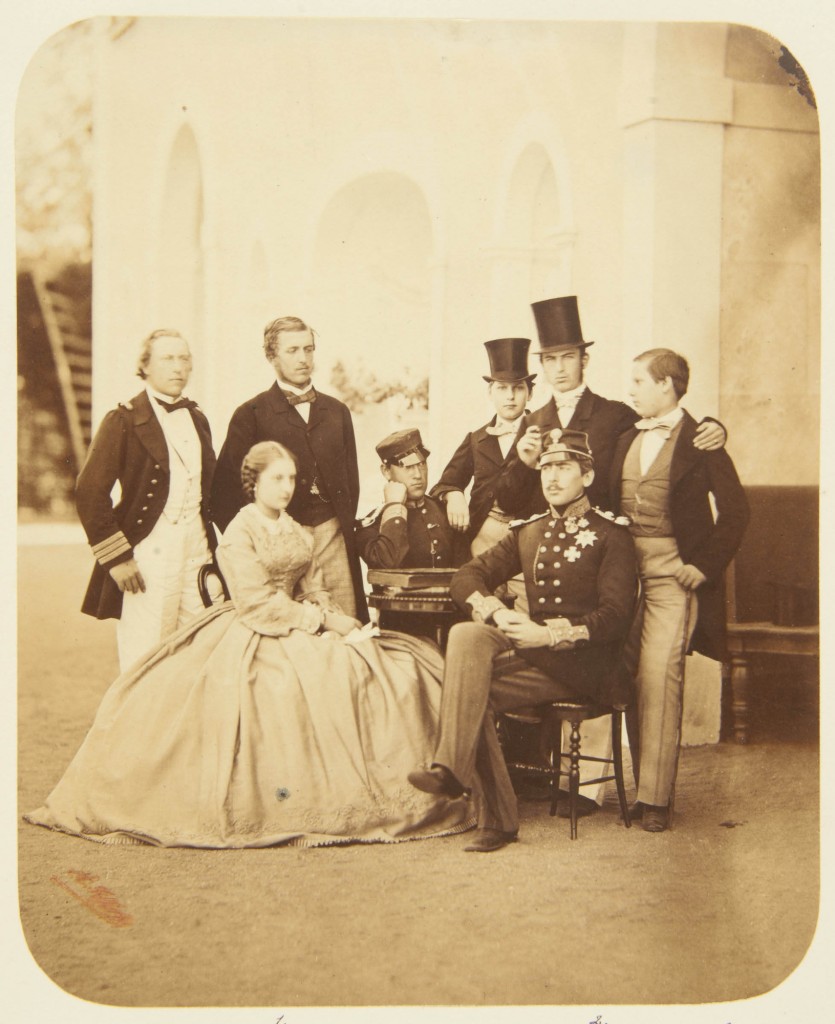
Photograph of a group including members of the Portugese Royal Family; seated in front: Infanta Donna Antonia (1845-1913) and King Pedro V (1861) (Photo: Royal Collection).
On 3 September, during a state visit to Emperor Napoleon III at Boulogne, Albert’s and Pedro’s paths crossed again. Pedro, on his way to Ostend and Osborne for the return leg of his tour, yet again made a favourable impression on his uncle. The following day Albert sent a telegram to Victoria asking her to keep the young royals at Osborne until his return. On 9 of September Albert returned to Cowes, on the Isle of Wight, just in time to catch his nephews before they returned to Lisbon. In his diary, Albert thanked a ‘piece of Portuguese backwardness’ – a coaling mishap on the royal yacht – ‘for the pleasure of seeing him again for a few minutes’. With the Grand Tour over and Pedro back in Portugal, the longest period these two men would be in each other’s presence ended, with the exception of a brief visit in August of 1855. Writing from Balmoral on 5 September 1857, Albert related to Pedro that since their first meeting: ‘I always knew that our family ties were to turn into friendship…that is, a harmony of feelings and character. You can count on my friendship; and I’m glad to find that you feel you need to bond with me’.
Albert’s feelings were reciprocated as Pedro returned the compliment in a letter to his bride on 19 March 1858: “I traveled so for the first time and was lucky to find in my path, Prince Albert, whose friendship … has brought me so much happiness’. This bond of friendship and mutual trust was further developed in their correspondence between 1854 and 1861. In his letters to Pedro, Albert acted as a teacher, mentor, advisor and, often enough, even a surrogate father. Pedro played the role of scholar and apprentice. It is fair to say, that apart from his beloved daughter Vicky, Pedro was probably the closest individual to Albert of the younger generation.
Advice fit for a King
On 4 September 1855, twelve days before Pedro came of age (at 18) and was proclaimed King in his own right, Albert already sent his congratulations. In this first, of 34 surviving letters, he set the tone of the relationship by telling the young monarch that the ‘Holy Spirit appreciates a good will and honesty…so if you want to attract, follow these virtues’. Thus the life-long, though tragically short, apprenticeship began.
As discussed earlier, Pedro had a tendency of champing at the bit with regard to dealing with his government. Albert, in the same letter of 4 September, shared his view that the happiness and wellbeing of a state could only be achieved through Divine Governance – that is to say, an imitation of a universal “natural law” by a sovereign through just use of the monarchical principle that encourages the creation of ‘good laws, institutions and useful healthy established principles’. Albert further stated that a constitutional government, though at times a burden for a monarch, does have its share of benefits including a protective shield against fallout from unpopular policies or in times of financial crisis.
In another letter (25 October 1855) Albert was complimentary of Pedro’s commitment to his duty, but he also cautioned him on the necessity of practicing the art of patience in regards to government or put at risk the fruits of his efforts. In an attempt to encourage, Albert recommended that Pedro keep the following lines, from a poem by Goethe, as a personal motto:
‘Wide the world, life never resting
Long the years of modest questing
Always delving, always founding
Never ending, often rounding
Faithfully the old retaining
New finds, open-minded, gaining
Pure the aims, promising the chances
Well! One should make some advances.’
Albert and Pedro were both avid readers, so when Pedro asked for recommendations, Albert was keenly forthcoming. In addition to sending along some precious volumes, he provided the young king with a brief description of each publication and, if the work was found to be especially invigorating or educational, an abridged review. A good example of the latter is the following review of Charles de Montalembert’s, The Political Future of England (1855): ‘It is a true masterpiece and very easy to read. England is the chosen theme, but it addresses the Continent; so everything you said is also perfectly suited to Portugal, and I believe that nothing could be more useful than translate it into Portuguese and disseminate it widely there’.
The reading materials provided, though largely of an educational bent, are refreshingly diverse and even liberal for a monarch of the period. Some of the gems include Pepys’s Diary which he advised Pedro to read first ‘because it is exhilarating’, Ludlow’s Memoirs ‘A Republican who considered Cromwell too monarchical’, and the speeches of that infamous English regicide, Oliver Cromwell, by T. Carlyle. Albert, likewise, made sure to have a copy of The Economist regularly sent to Lisbon in order to keep the King well versed on important economic and trade developments.
As early as 13 December 1855, Albert was already stressing to his nephew the importance of having both a private secretary and a librarian. This was particularly important given his exalted position. Speaking from his own personal experience, he pointed out that without reliable men in these positions, ‘I am afraid you will succumb to the weight of your work’. This advice must not have been taken to heart, because the sentiment was repeated in 1857. Albert, for a second time, mentioned the importance of hiring a private secretary and librarian, this time even going so far as to provide Pedro with the qualities he should be looking for in both. The ideal candidate for a private secretary should be ‘smart, efficient and hardworking, not too old,’ and able to relieve him from the ‘consuming burden of paperwork and prepare for you the analysis of the issues’ as required. In a librarian, scholarly training is ideal. He should be in constant touch with advances in science and be able to maintain ‘books and papers in order, and keep you always informed on ‘everything that goes on in the great world’. Furthermore, the librarian should be able to assist in addressing issues e.g. education and hospitals. Albert’s last point on the subject was, ‘If an individual with this profile cannot be found in Portugal, it is preferable to hire a foreigner than to not hire anyone’. It is evident, from the list of qualifications for these positions, that Albert used his own staff as a model for Pedro to emulate.
Albert’s lectures on the importance of Pedro maintaining his health is a common theme in the correspondence, dating all the way back to November of 1855. The young king, ironically like his uncle, made a bad habit of working himself to exhaustion. By 30 January of 1857, Albert had good reason to be concerned. After disturbing reports of Pedro’s self-neglect and, upon viewing a photograph, Albert observed that it ‘shows you sick and afflicted’. In the manner of an intervention, he wrote out a proposed list of how Pedro should put his ‘house in order’. In addition to the suggestions, which had, by this stage, morphed into quasi-demands, he reiterated that he must get a private secretary and librarian to remove some of the burden. He also stated, explicitly in his fourth and final point, that a Queen was needed, not only to provide a sense of domestic normality and stability but also to improve Pedro’s health by encouraging the better angels of his nature. Albert had good news for his nephew; he had found an ideal prospect, Stephanie of Hohenzollern-Sigmaringen. Not only was she a catholic, but she also was also well linked to the Prussian Royal House.
Marriage: An ‘heir’ necessity
For Albert, finding a suitable bride for Pedro had been a project long before the intervention letter of 1857. Princess Stephanie of Hohenzollern-Sigmaringen was exactly what was needed. She was young, good looking, well educated, Catholic, and most important of all, she was not of Bourbon or Habsburg blood. This, in Albert’s eyes, would further improve the future stock of the Portuguese Royal House. In a letter to Pedro (29 March 1857), who was dragging his feet, he wrote that he did not believe that a better candidate could be found, ‘at least the Gotha Almanac tells me there is little choice’. He pressed the case further by pointing out that he would have the advantage of marrying a liberal Catholic princess raised in Protestant House. After further negotiations and some additional light prodding by Albert, who was acting as negotiator between the two houses, the union was officially proposed and consented to by June 1857. In his congratulatory letter of the 26th, with the marriage date now set, Albert suggested that Pedro should appoint an official negotiator. His last item of business was handling the delivery of the letters between the King and the family of his new bride.
Pedro and Stephanie were wed by proxy on 29 April 1858 in Berlin. Afterward the new Portuguese Queen made her way to Britain. Like Pedro, on his Grand Tour in the summer of 1854, Stephanie charmed everyone she met. The actual wedding took place in Lisbon on May 18, 1858. The marriage did not last long. The young queen died on 17 July 1859, from diphtheric angina that she contracted while opening the new railway at Vendas Novas. The death was a terrible blow for the family and it appears to have reawakened the morbid side of Pedro’s character who, in responding to a minister’s letter of condolences, stated ‘I and my peoples have been companions in misfortune’. On the 20 July Albert wrote to Vicky stating ‘I tremble for Pedro, whose deficiency in vivacity and cheerfulness… found its only compensation in his home happiness’. In Pedro’s letter to Albert, the sense of loss still echoed, ‘She was too good, my Stephanie, and a sense of duty urged us both. We were happy in our most hidden privacy, and we were able to defend it’. The letter ends with a request for Albert’s assistance in designing a hospital for poor children, which Stephanie had intended, now to be built in her memory.
Tragic death of the young King
The last letters exchanged between Albert and Pedro (16 May and 22 August 1861) discussed the necessity of the king’s remarriage. There appeared to have been a proposal of a union between the Portuguese and Spanish Houses, which Albert admitted he was surprised to hear. He went further by weighing the pros and cons of such a match. On a personal level, the Infanta’s character left much to be desired and the blood ‘promises little spiritual health, moral or physical’. On a political level, it offered the benefit of a better relationship with Spain. However, the likelihood of Portugal being dragged into Spanish disputes also increased. Towards the end, Albert advised caution, but he need not have worried. In his response Pedro stated that he had declined the offer. But his letter also revealed a lingering sense of depression and melancholy. On 11 November 1861, aged only 24, Pedro succumbed to typhoid fever. The young King’s death had a profound effect on Albert, as he related in a letter to King Wilhelm of Prussia dated 22 November, ‘I loved him and valued him greatly, and had great hopes’. Victoria shared their grief in a letter to daughter Vicky: ‘It has been a terrible blow to us – & to dearest beloved Papa – who found in him one entirely worthy of himself – which he alas! does not find in those where it was most expected and wanted.’
Three weeks after writing these letters, Albert would also be dead, thus ending the dreams of what might have been the fruitful collaboration of a gifted master and his talented apprentice – heir to a better future when monarchy would “effect infinite good.”
Suggested further reading
- D. Pedro V and Príncipe Alberto, Correspondência entre D. Pedro V e Seu Tio, o Príncipe Albert, Ed. Maria Filomena Mónica. Trans. Dagmar Steinlein da Mata Reis (Lisboa: ICS/Quetzal Editores, 2000)
- Albert, Prince Consort, Letters of the Prince Consort 1831-1861, Ed. Kurt Jagow. Trans. E.T.S. Dugdale (London: John Murray, 1938)
- Albert, Prince Consort and Ernst, Duc de Saxe-Cobourg-Gotha, The Prince Consort and his brother: two hundred new letters, Ed. Hector Bolitho (London: Cobden-Sanderson, 1933)
- Theodore Martin, Life of the Prince Consort. Vols. III – V (London: Smith, Elder, & Co., 1876)
- Júlio de Vilhena, D. Pedro V E O Seu Reinado, (Coimbra: Imprensa da Universidade, 1921)
- Hannah Pakula, An Uncommon Woman: The Empress Frederick: Daughter of Queen Victoria, Wife of the Crown Prince of Prussia, Mother of Kaiser Wilhelm (New York: Touchstone, 1995)
- Goethe Poem: Translation of German original as found in: Otto Magnus, Rudolf Magnus: Physiologist and Pharmacologist 1873-1927 (Amsterdam: Royal Netherlands Academy of Arts and Sciences, 2002)
* In short, the notion of the Monarchical Principle is the breadth of the role played by the monarch in the operation of the state. The extent of the parameters to which a prince might govern is dependent on a state’s orientation on a liberal/conservative scale e.g. a constitutional (Britain) vs. autocratic (Russia) monarchical system.

